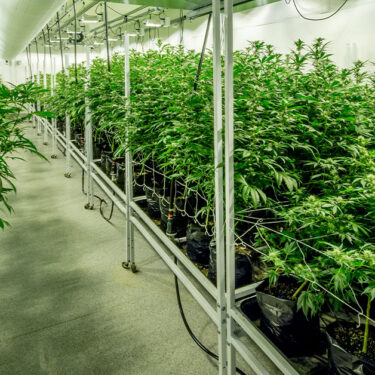In a growing number of communities around the U.S., new cannabis lounges are offering a social setting where guests can openly use marijuana products. Colorado and New Mexico both saw their first cannabis lounges open in April, Michigan’s first marijuana lounge is set to open this summer, and officials in Nevada are currently discussing how the recently-approved class of businesses should be regulated. In West Hollywood, California, where the state’s first cannabis lounge opened in 2019, multiple new lounges are now in the works after two years of slowdown due to the pandemic.
The bar-like establishments add a new dimension of potential revenue — and risk — to an industry that is expected to add almost $100 billion to the U.S. economy this year.
“It is definitely a new and emerging segment within cannabis,” said Jason Scheurle, National Product Leader, Cannabis, Burns & Wilcox, based in Philadelphia, PA. “It is not happening in every legal state, but more are starting to enact regulations to provide for some type of on-site consumption.”
These new ventures would need insurance policies tailored to address the risks of serving marijuana products, which could be looked at similarly to liquor liability for bars and restaurants, said Leena Malik, Senior Underwriter, Commercial Insurance, Burns & Wilcox, Toronto, Ontario.

It is not happening in every legal state, but more are starting to enact regulations to provide for some type of on-site consumption.
“Whether it is alcohol or cannabis, it impairs your judgment and could lead to really anything, depending on the way someone reacts to the drugs in their system,” she said. “How do you know when to cut someone off? You 100% run that risk [of being sued].”
Cannabis lounges could be held liable for overserving patrons
Cannabis lounges are not allowed in Canada, although officials in British Columbia are seeking public input on permitting marijuana consumption in outdoor-only lounge or festival settings, the Vancouver Sun recently reported. A push for indoor public consumption lounges is not expected, Malik said.
“They really just want to operate as ‘purchase your products from the government and consume them responsibly on your own, if you are of legal age,’” she said. “[Officials] are not really looking to encourage it in the sense of opening lounges.”

Whether it is alcohol or cannabis, it impairs your judgment and could lead to really anything, depending on the way someone reacts to the drugs in their system. How do you know when to cut someone off?
If a cannabis lounge faced a lawsuit alleging that it overserved a patron, leading to a third-party bodily injury, the business’s Commercial General Liability (CGL) Insurance and Products Liability Insurance could potentially cover costs such as legal defense, medical expenses, and settlement amounts. Until such a case occurs, it is not yet known how exactly these lawsuits would be covered by insurance.
“That is largely untested, so it is hard to speak to exactly how that would play out,” Scheurle explained, pointing to the short history of cannabis lounges in the U.S. “Many of the policies within the cannabis industry are highly exclusionary. It could exclude a loss that is deemed to have arisen out of the use of cannabis, for example.”
The potential for a significant loss is clear, however, and can be seen in recent liquor liability lawsuits. In early April, a $20 million lawsuit was filed against a nightclub in Houston, Texas, alleging that it overserved customers and allowed underage drinking, contributing to a drunk driving crash that killed a teen, ABC 13 reported. In December of 2021, a jury in Texas awarded the family of two drunk driving victims over $301 billion after a lawsuit alleged the driver was overserved at a bar before the accident; though largely symbolic, the settlement marked the largest personal injury award in U.S. history, CNN reported.
“Obviously, you are more or less encouraging intoxication of patrons on your premises. In that sense, it is very similar to a liquor liability type situation,” Scheurle said. “If somebody is overindulging at your business and they leave and cause injury or death, that could come back to the establishment.”
While it remains to be seen how cannabis overserving lawsuits could play out in American courts, Canadian marijuana business owners should know that any on-site consumption of cannabis products will not be covered by their insurance policies. “What consumers do with that product afterward would not fall to the responsibility of the individuals that sold it,” Malik said. “If someone is serving cannabis on their retail store premises in Canada, it is not legal and their insurance would not respond to that.”
Lawsuits also possible over product issues, budtender advice
Even cannabis operations that do not allow on-site consumption can face potential liability related to the products they sell, making Products Liability Insurance and Product Recall Insurance necessary for growers and retailers. They should also consider Employment Practices Liability (EPL) Insurance to cover staffing-related allegations such as discrimination, Scheurle said, and ask their insurance broker whether budtender liability is included in their CGL Insurance policy.
Budtenders, or individuals who work at marijuana retailers, are not allowed to offer medical advice to consumers and must walk a “fine line” between giving advice versus general information on products, the Cannabis Business Times reported in 2018. Though Scheurle is not aware of any lawsuits that have been filed over a budtender’s advice, “it would ultimately be up to the courts and the lawyers as to how those proceedings would play out,” he said.
“Budtender liability is not that different from professional liability,” Scheurle said. “This is more like an incidental coverage based off the budtender’s informal advice, and we do have carrier partners today that can offer that.”

If somebody is overindulging at your business and they leave and cause injury or death, that could come back to the establishment.
Regulations vary by province, Malik said, but it is also the general consensus in Canada that budtenders should not advise consumers on specific products. “They can guide you, based on the approved marketing material, but it is more like a cashier role at a liquor store than a bartender who can design a cocktail for you,” she said.
CGL Insurance can also cover in-store slip-and-falls and other third-party injuries and property damage. Because most cannabis retail stores are fairly small and “usually very well-kept and well-managed,” Malik said, these incidents have been rare — though capacity restrictions due to COVID-19 may have played a role. “It has often been only one customer at a time, alleviating some of the potential for a slip-and-fall incident to occur,” she said.
Theft, vandalism among top threats to cannabis businesses
Whether or not a marijuana business includes a lounge for cannabis use, any business in this industry may be more vulnerable to certain risks, including theft and vandalism, Malik and Scheurle agreed. In the U.S., where many marijuana companies operate on a cash-only basis because of banking difficulties tied to recreational marijuana being federally illegal, a recent surge in cannabis shop robberies has led to calls for a new banking bill, NPR reported on April 20. Some of these incidents have even turned deadly, including an April 30 dispensary robbery in Los Angeles, California, during which one man was reportedly shot and killed, the Cannabis Business Times reported.
“We are talking about large amounts of cash daily and they might have to make multiple bank runs throughout the day,” Scheurle said. “It is certainly a heightened exposure, and it is extremely difficult to manage at this time because of the banking issues.”
Theft is also a leading concern for Canadian cannabis shops, Malik said. “Because of the product, theft is the number one peril that we see,” she said. “Retailers are well aware of this, and we do see security measures in place. However, you cannot prevent crime with absolute certainty. You still run the risk of individuals smashing windows and breaking through barriers to clean out a store when they can.”
From robberies and vandalism to fires and flooding, Commercial Property Insurance is a key protection for cannabis retailers. Equipment Breakdown Insurance may also be needed, particularly when the stores contain expensive refrigeration equipment. “The potential loss is large” in this industry, especially at growing facilities, Scheurle said. “There is a lot at stake with such high-value equipment.”
On April 20, a Springfield, Missouri, medical marijuana dispensary was damaged when a Tesla SUV crashed into the front doors of the business, the Springfield News-Leader reported.
“You always have that risk,” Malik said of the recent crash. “In some cases, that can also be a way for individuals to break and enter into a store.”
Security systems, employee training can help reduce risks
Installing bars on glass windows and doors is another loss prevention measure we strongly encourage, Malik said. “There is an additional layer of security to get through; it is not going to be an easy or quick process, and the alarm will trigger,” she said.
Working with an insurance broker who is specialized in the cannabis industry can help business owners explore available coverage options, Malik added. “With cannabis or any type of risk, you should always work with someone who has knowledge and expertise in that area,” she said. “When you work with someone who knows the ins-and-outs of the regulations, you can have more peace of mind.”
Understanding your policy “in its entirely” is also essential, Scheurle said. “These policies have any number of different limitations and exclusionary forms that can preclude you from collecting if you had not understood and followed the language of the policy,” he pointed out. “In a transportation situation, for example, you might have a risk warranty that requires two drivers in that vehicle at all times, or GPS monitoring on the vehicle. In the event of a claim, if the investigation determines the business did not have those items present at the time of loss, that is not going to be covered.”
In a rapidly growing and changing industry, business owners should not underestimate the value of working with “a team of experts that are on the cutting edge of the industry.”
“They will be aware of the different legal environments in each state or even each city or county. Cities and counties can add different levels of compliance matters,” Scheurle said. “As a buyer, you can be confident that you have the most recent information and will be in compliance with state law and any insurance requirements that may be present as well. Being able to explain the differences between the markets and the coverage options is beneficial to any business owner in this segment.”










